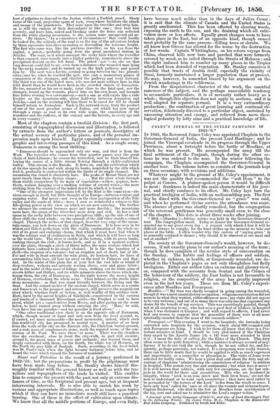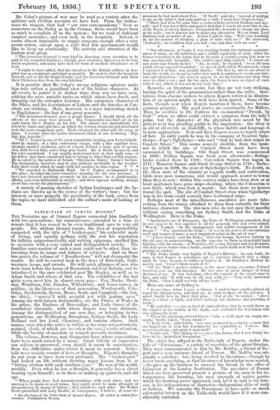COLEY'S JOURNAL OF THE SUTLEJ CAMPAIGN IN
1845-'6.*
IN 1845, the Reverend James Coley was appointed Chaplain to the Governor-General of India, the present Lord llardinge ; and he Joined the Viceregal cavalcade in its progress through the Upper Provinces, about a fortnight before the battle of Moodkee, at which he was present. He accompanied the army till the final settlement of the Punjaub, though during the other ac- tions he was ordered to the rear. In the winter following the campaign, the Chaplain accompanied the Governor-General in another tour. The volume before us consists of the journals kept on these occasions, with revisions and additions.
Whatever might be the ground of Mr. Coley's appointment, it was not the quality that recommended the "soft Dean" to the pulpit at Canons. A plainer-spoken person it would be difficult to meet : frankness is indeed the main characteristic of his jour- nal, and chiefly. conduces to its effect. Mr. Coley lays bare the practical irreligion. of India, with an undissembling pen. The first day he dined with the Governor-General no " grace " was said, and when he performed divine service the attendance was scant. The absence of grace was shortly remedied, but the congregation of the reverend gentleman was generally small even to the close of the chapter. This date is about three weeks after joining.
" 281h.—(Sunday.)—Divine service was held in the Governor-General's tent. The congregation small. Today at dinner the Governor-General re- quested me to say grace every day : a request with which I fear it will be difficult always to comply, for the band strikes up the moment we take our places at the table. I often wonder why this custom of saying grace ' is so generally confined to dinner ; why should it be observed at one meal and not at another ?"
The society at the Governor-General's would, however, be de- corous, if not exactly pious in our author's meaning of the term ; though he does complain of the secular style of conversation on the Sunday. The habits and feelings of officers and soldiers, whether in sickness, in health, or dangerously wounded, are de- picted in the Chaplain's pages as not only thoughtless but flatly irreligious. Either our author takes an extreme and gloomy view, or, compared with the accounts from Scutari and the Crimea of the behaviour of the soldiery, the East Indies is not favourable to religion, or the composition of the army has greatly improved even in the last ten years. These are from Mr. Coley's experi- ences after Moodkee and Ferozepoor.
Moodkee.—" My time was chiefly occupied in going among the wounded, though it was a most unsatisfactory occupation : religious conversation did not seem to be what they wanted, either officers or men ; my visits did not appear to be very welcome; and out of so many there was only one that expressed any desire for the benefit of my services. This was exceedingly painful, though not at all surprising to me, who had seen a good deal of soldiers in hospital when I was stationed at Unmoor ; and with regard to officers, I had never had any reason to suppose that the generality of them were at all more spiritually-minded than the mass of the common soldiers."
Ferozepoor.—" This evening I went to the hospitals, the barracks being converted into hospitals for the occasion, where about 900 wounded and sick Europeans are lying. I wish to let them all know that there is a Pro- testant minister at hand. I should be veri glad indeed if the Christian ch. v. 14 we duty urged by the Apostle James (re more attended to than it is : I mean the duty of calling for the E der of the Church. This duty often seems to be quite forgotten ; while a minister is always accused of neg- ligence if he do not visit the sick, though he be not called for, and fre- quently, perhaps generally, not wanted. If a clergyman were really wanted, there can be little doubt that he would be applied to with as much eagerness and importunity as a counsellor or physician is. The visits of Jesus were solicited for bodily cures. We hear a great deal said about the duty and ad- vantage of chaplains administering the consolations of religion' to soldiers in hospital. This sounds very fine and sentimental ; but what does it mean ? It is well known that soldiers, with very few exceptions, are the last sub- jects in the world for these said consolations. Men who are hardened in iniquity, whose neck is an iron sinew and their brow brass,' are not the men to understand or to want such consolations : they have need rather to be persuaded by the terrors of the Lord ' to flee from the wrath to come. I have only been' called for ' once at all since the wounds and sickness began. Captain Dashwood, who died in the fort at Moodkee from mortification of the leg, sent and asked me to administer the Lord's supper to him. "
* Journal of the Sutkj Campaign of 1845-'6 ; and also of Lord Mardinge's Tour in the following Winter. By James Coley, M.A., Chaplain to the Honourable Bast India Company. Published by Smith and Elder.
Mr. Coley's picture of war may be read as a variety after the military and civilian accounts we have had. From his indica- tions we suspect, that had " our own correspondents" been as numerous on the Sutlej as in the Crimea, there would have been as much to complain of in the system ; for we read of deficient surgical assistance, and even food, in the hospitals. Indeed, it seems almost impossible to supply surgeons enough after a very severe action, except upon a scale that few governments would like to keep up continually. The activity and attention of the leaders were great.
" The Governor-General is very kind in directing every attention to be paid to the wounded Siplihees ; though, poor creatures, they seem to be very much neglected, and many have died for want of medical attendance or of food.
"I ought to have added, that his attention to the British soldiers in hos- pital was as considerate and kind as possible. He used to visit the hospitals himself, and so did Sir Hugh Gough ; and the Governor-General sent them their Christmas fare from his own kitchen."
It is possible that Mr. Coley's strong religious opinions make him take rather a jaundiced view of the Indian character. At all events, he paints it in darker tints than any we have seen, sinking the more amiable traits on which others have dwelt, and bringing out the corrupter features. His outspoken character of the Sikhs, and his descriptions of Lahore and the fanatics at Ijm- ritsir, are striking. Here, however, is a more interesting sketch to Englishmen : the last of our great generals.
" The Governor-General gave a grand dinner. I should think all the officers of the army were present. The Commander-in-chief sat on his right hand, Sir C. Napier on his left. The dinner was immediately fol- lowed by toasts and speeches, in which the veteran triumviri just mentioned took the most conspicuous part. Each eulogized the other and the AMIN" at large. I wonder what the native attendants think of our deafening Hip, hip, hip, hurrahs !' " Sir C. Napier is one of the most remarkable-looking men I ever beheld : short in stature, of a thin cadaverous visage, with a fine aquiline nose, strongly marked eyebrows, eyes of a hawk behind a huge pair of specta- cles, dark brown hair, and a long grey beard. He is fluent in speech, and his voice sepulchral. I can readily understand how at first sight some of his fellow men have considered him to belong to other than earthly regions. He is called by the natives of Scinde Shytiin-ka bhilee,' Satan's brother. The designation, however, may be also perhaps ascribable to, the wonder-
fully short work which he made with his enemies in that region. * * " We marched to Shalamah Bigh. Sir C. Napier accompanied us to this place ; he takes his leave tomorrow morning for his own province. I have not observed anything eccentric in his manner : he is gentlemanly, affable, and even deferential in society ; and there appears nothing strange about hini except his physiognomy."
A variety of passing sketches of Indian landscapes and the In- dians are thrown up in the course of the writer's tour ; but the interest, or more properly the peculiarity of the book, arises from the topics we have indicated and the author's mode of looking at them,



























 Previous page
Previous page